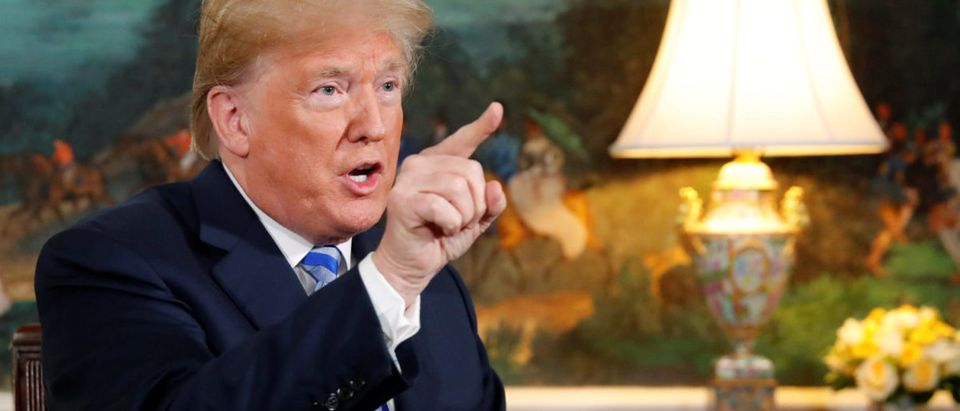Secretary of State Mike Pompeo has laid out a new strategy for dealing with the Islamic Republic of Iran, and it predictably adds to the assertiveness that has defined the Trump administration’s approach since day one.
That approach was certainly on display earlier in the month when the president announced withdrawal from the Iran nuclear deal, but doing so only opened the door for nuclear-related sanctions to rejoin a package of terror-related sanctions that Trump had already expanded over the preceding months.
Setting aside the question of the nuclear deal, the administration’s broader effort to constrain the Islamic Republic and to publicize its malign behaviors is a much-needed step in the right direction. The president’s sanctions strategy finally put into practice an appropriately expansive view of culpability for Iran’s human rights violations and financing of terrorist proxies.
Regardless of what anyone thinks of other aspects of Trump’s foreign policy, he should be applauded for extending terror-related sanctions to include the entirety of the Iranian Revolutionary Guard Corps, instead of just its foreign expeditionary wing, the Quds Force.
The narrower approach had been a defining feature of Western policies toward Iran for an extremely long time, and it has never served us well. It is largely because of the implicit permissiveness of that approach that Middle Eastern crises have escalated to their current state. Constraints on the Quds Force were effectively meaningless when they were not supported by efforts to attack the financial assets of its parent organization.
But even before Pompeo announced a more cohesive and elaborate strategy, the Trump administration stepped up its financial pressure, once again, by announcing sanctions on the governor of the Iranian central bank, thus undermining much of the IRGC’s clandestine financial network.
According to informed sources such as the National Council of Resistance of Iran (NCRI), the leading advocate for democratic governance in Iran, the IRGC currently controls more than half of the country’s gross domestic product, partly through expanding government earmarks but mostly through a network of front companies and private-sector affiliates. Had this control continued to go unchallenged on the international stage, there is no telling what the already powerful IRGC would have been capable of in the years to come.
As it is, impeding the hardline paramilitary’s financial network promises to impede its influence over foreign conflicts and regional proxies as well. There is much ground to be made up in the aftermath of decades of naïve and wrong-headed foreign policy, but recent sanctions have started the U.S. and its allies in the right direction, and Pompeo’s speech on Monday set the U.S. on the course to expanding that project.
The Secretary of State indicated that Iran will soon be subject to “unprecedented financial pressure” and will consequently find itself battling to keep its economy afloat unless it halts its expands on its former nuclear agreements, halts its regional aggression and begins to serve the interests of the Iranian people.
There is clearly a strong presence of local partners, who are still active months after the January uprising. Just days before Pompeo was scheduled to speak on Iran policy, the southern Iranian city of Kazeroon was rocked by the latest in a series of protest, this one resulting in the death of several demonstrators and the burning of a police station.
The Iranian regime acknowledged that the activists of the Iranian opposition known as the People’s Mojahedin Organization of Iran (PMOI/MEK) played an important role in fomenting the unrest. While Tehran sought to downplay the violence, in the information age, it cannot adequately conceal the bodies of the dead. Nor can it deny that the Kazeroon protest was not an isolated incident, locally or nationally.
The wave of unrest that has begun since the start of this year involved chants of “death to the dictator” and other slogans that made no secret of the people’s earnest desire for regime change and the establishment of a truly democratic system in place of the theocratic dictatorship. The uprising led NCRI president Maryam Rajavi to declare that the year to follow would be “a year full of uprisings,” and that it would lead to the people’s ultimate victory over the clerical regime.
The NCRI soon holds its annual Iran Freedom rally on June 30 in Paris. The event is expected to draw a crowd of 100,000 supporters, including hundreds of dignitaries from the policy circles of the U.S., Europe, and much of the world. They want to send a strong message that the dissidents are more optimistic than ever before to witness a major change in Iran in the foreseeable future.
Every policymaker who is committed to democracy in Iran and peace in the broader region should prepare to close ranks with Iranian dissidents. And for those whose governments are already taking appropriate steps by expanding, clarifying, and strengthening their Iran posture, there has never been a better time to express solidarity with the Iranian resistance.
Professor Ivan Sascha Sheehan is the incoming Executive Director of the School of Public and International Affairs at the University of Baltimore. Follow him on Twitter @ProfSheehan.
The views and opinions expressed in this commentary are those of the author and do not reflect the official position of The Daily Caller.


